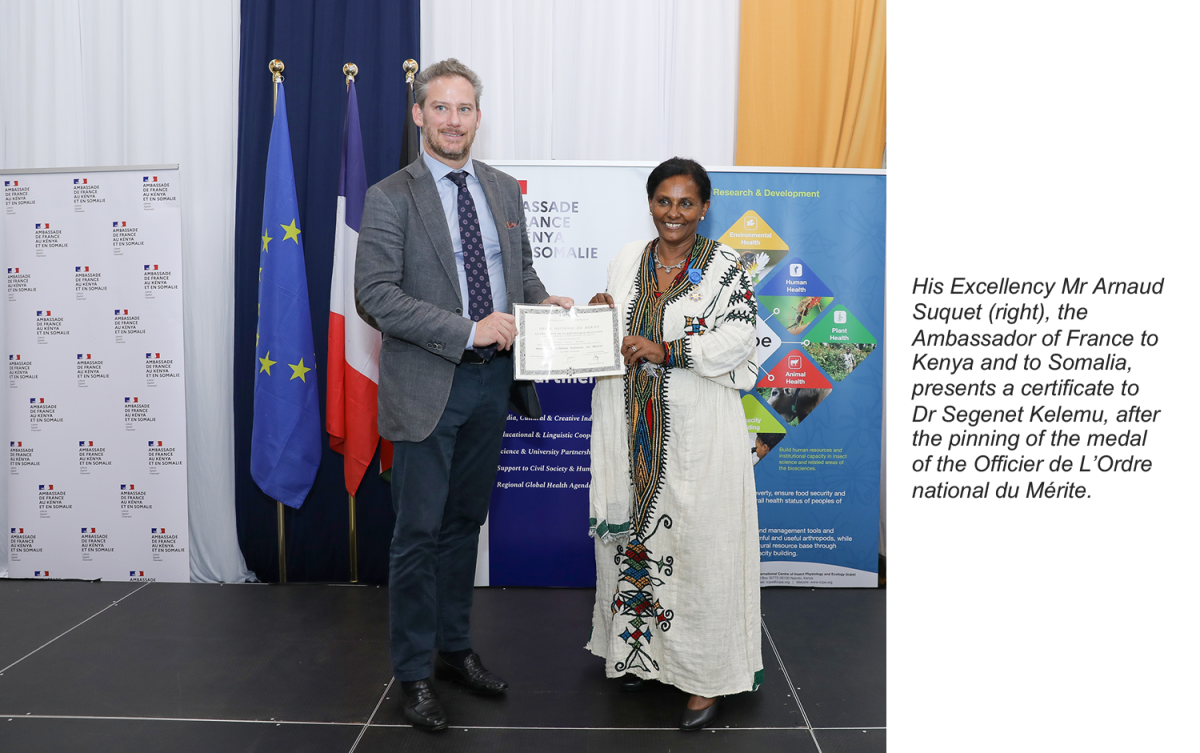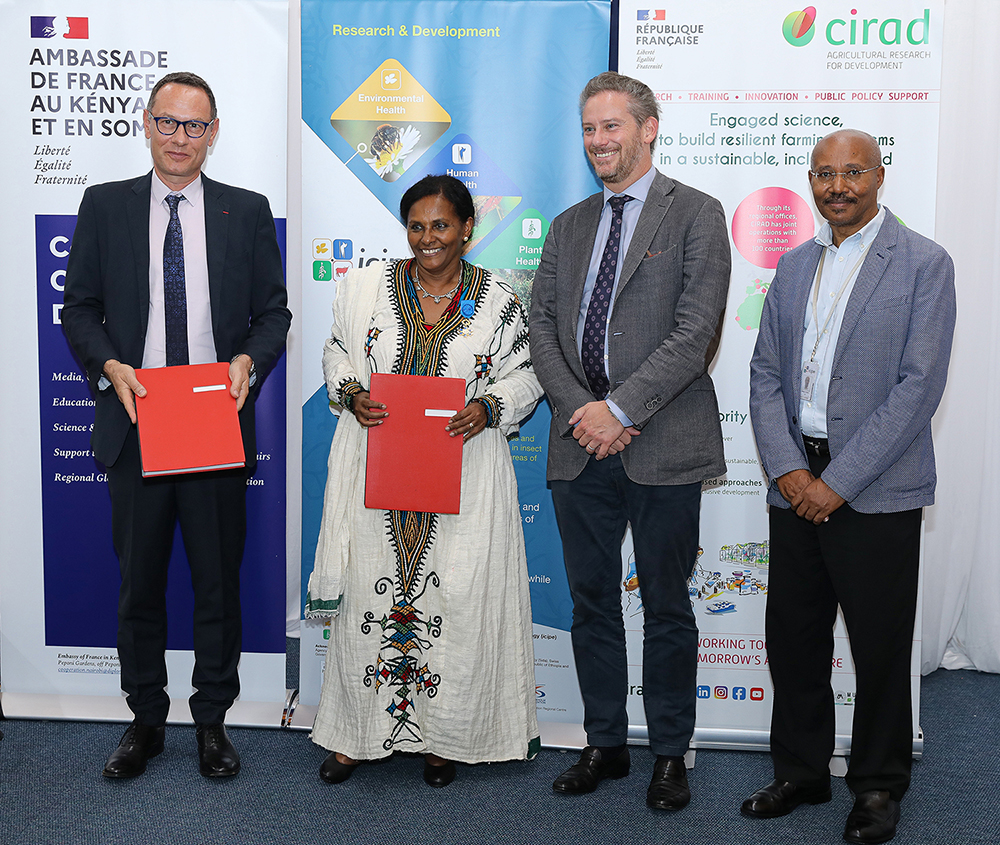France-icipe partnership reinforced with award of top honour to Centre’s Director General and renewal of partnership arrangement with key research institute
icipe Director General, Dr Segenet Kelemu, has been decorated with the second highest award of France; the title of Officier de L’Ordre national du Mérite (Officer in the National Order of Merit). The honour is awarded by the President of France, to French citizens as well as foreign nationals in recognition of distinguished services or acts of devotion, bravery, generosity and commitment to the service of others, in the military or in the public and private sectors. Dr Kelemu was rewarded for her efforts in building cooperation between icipe and French scientists. She becomes the first Ethiopian, and one of a handful of Africans that have received this honour.
His Excellency Mr Arnaud Suquet, the Ambassador of France to Kenya and to Somalia noted: “Under Dr Kelemu’s leadership, impactful results have been achieved by icipe in cooperation with researchers from around the world. They include French researchers from the Agricultural Research Centre for International Development (CIRAD), and the National Research Institute for Sustainable Development (IRD).”
Dr Kelemu said: “I am most honoured to receive this recognition. I accept it with great humility fully aware that it is not a personal achievement, but a true endorsement of one of the ideologies that I have held dearly throughout my career – the power of partnerships in science. My journey to becoming a scientist started in rural Ethiopia, where I was inspired by the possibility of changing the lives of communities through science and agriculture. I know that my vision has succeeded because of the immense network of people that I have encountered; the synergy of resources and expertise, dreams and aspirations, to create sustainable solutions.”

Having assumed leadership of icipe in November 2013, Dr Kelemu is the first woman and the second African to head the institution – Africa’s only research institution dedicated to research on insects and other arthropods. She took the Centre’s helm after a highly prolific scientific career (1992–2007) at the International Center for Tropical Agriculture (CIAT) in Cali, Colombia; as the Director of the Biosciences eastern and central Africa Hub at the International Livestock Research Institute (BecA-ILRI Hub), from 2017 to 2012; and as Vice-President of Programmes at the Alliance for a Green Revolution in Africa (2012 – 2013).
At icipe, Dr Kelemu has advanced the Centre’s global status as a model of excellence. icipe uniquely combines the generation of world-class knowledge, and its translation into nature-based, One Health, inclusive innovations that improve food, nutritional security and health, environment and livelihoods. The Centre also manages BioInnovate Africa Programme, one of the largest regional bioscience research and innovation-driven initiatives; and the Regional Scholarship and Innovation Fund (Rsif), the flagship programme of the Partnership for Skills in Applied Sciences, Engineering and Technology (PASET), an initiative established in 2013 by African governments and partners.
Collaboration between icipe and French institutions
Dr Kelemu has enhanced the longstanding partnership between icipe and French institutions, primarily IRD (since 2001) and CIRAD (from 2012). Through the cooperation, scientists from these two organisations are either hosted by icipe, or spend significant amounts of time each year working at the Centre. Over the past 10 years, this relationship has been broadened to intensify skills synergies and linkages with icipe programmes, and to integrate scientists from the two organisations into the Centre more effectively.
icipe collaboration with IRD has built on the extensive research on the diversity of stemborers, important pests of maize, and their interactions with their natural enemies. The researchers explored the ecological and evolutionary processes between grasses, the pests and their natural enemies, as well as the risks resulting from man-made activities on natural environments. Current studies are focusing on the invasive fall armyworm, aiming to understand how the pest unbalances or modifies the interactions between stemborers and their natural enemies. Using dynamic models, the studies have predicted the coexistence of the fall armyworm with stemborer species, and the dominance of the invasive species, alongside the exotic stemborer, Chilo partellus. The scientists are also working on the biological control of the Mediterranean corn borer, to generate knowledge for the commercial use of a wasp (Cotesia species) that can naturally control the pest.
Collaborative projects between CIRAD and icipe include two recently concluded research thrusts: the exploration of semiochemical compounds for pest control and development of eco-friendly nets to protect horticultural crops from pests. Ongoing projects include:
- HonOgiek, a project funded by the French Development Agency and coordinated by CIRAD, which aims to develop a Geographical Indication (GI) of the traditional honey from Mau Forest, in Kenya’s Rift Valley, which is the largest indigenous montane forest in East Africa. A GI is important as it identifies and protects products that possess the unique qualities, characteristics or reputation associated with a product and a particular geographic region. In regard to HonOgiek, the GI certification will document the traditional process of its production and uniqueness, and clearly stipulate what can be referred to as “Ogiek honey”. These qualities will be protected by the community and any other organisation supporting the GI. The certification will also contribute to biodiversity protection, as the honey is associated with specific indigenous trees in the region.
- COntrolling and progressively Minimising the Burden of Animal Trypanosomosis (COMBAT, funded by EU Horizon 2020 research and innovation programme): the initiative will strengthen control and prevention of animal trypanosomosis (known commonly as nagana); the most devastating disease of livestock, which causes direct and indirect losses of approximately USD 4.75 billion per year in Africa. The researchers will improve basic knowledge of the disease, develop innovative control strategies, build capacity and raise awareness on the disease. Significantly, the team will create strategies to timely detect, monitor and predict tsetse flies, the insects that transmit the parasites that cause nagana. An important output will be a tsetse atlas that will guide the design and deployment of cost-effective, large-scale tsetse control tools.
- Development of Smart Innovations through Research in Agriculture (DeSIRA) project titled: Transforming robusta coffee agroforestry to improve the resilience of smallholders to adapt and mitigate climate change (funded by the European Union).
- Plant Health Theme: to support basic and applied research on native and invasive, below- and aboveground, pre- and postharvest pests, under changing climate and habitats multidisciplinary research using a One Health concept.

Notes for Editors
For further information on Dr Segenet Kelemu: https://en.wikipedia.org/wiki/Segenet_Kelemu
The International Centre of Insect Physiology and Ecology (www.icipe.org): headquartered in Nairobi, Kenya, is the only research institution in Africa working primarily on insects and other arthropods. The Centre conducts world-class science, and then translates this knowledge into innovate environmentally friendly, affordable, accessible and easy to use solutions to tackle crop pests and disease vectors. icipe’s role also extends to the conservation and sustainable exploitation of the beneficial insect biodiversity. Thus, icipe works through the 4Hs Themes – Human Health, Animal Health, Plant Health and Environmental Health – a holistic and integrated framework that has sustainable development as its basis, to improve food security, health and the overall well-being of communities in Africa. We gratefully acknowledge the support of icipe core donors: Swedish International Development Cooperation Agency (Sida); Swiss Agency for Development and Cooperation (SDC); Australian Centre for International Agricultural Research (ACIAR); Federal Democratic Republic of Ethiopia and Government of the Republic of Kenya. The views expressed herein do not necessarily reflect the official opinion of the donors.

